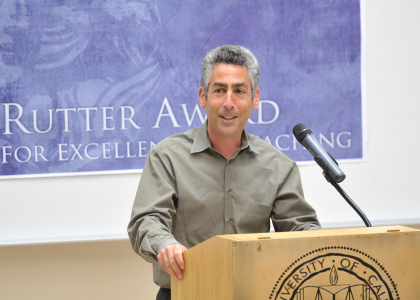UCLA Law professor Stuart Banner delivers oral argument at the U.S. Supreme Court

When the U.S. Supreme Court opened its term on Oct. 6, the first case on the docket was Villarreal v. Texas, an appeal that UCLA School of Law’s Supreme Court Clinic brought to the high court – and Professor Stuart Banner, who runs the clinic, was the first person to deliver oral argument before the justices.
The clinic’s client was a man who claimed that his Sixth Amendment right to counsel was violated when the court recessed for the day in the middle of his testimony and he was not allowed to talk with his lawyer about his testimony during the break. The man was later convicted of killing his boyfriend. Banner traveled to Washington, D.C., and made his case, arguing that the Texas Court of Criminal Appeals erred in ruling that the man’s rights had not been violated.
“The defendant and counsel often must discuss the defendant’s testimony during an overnight recess,” Banner told the justices. “The court below tried to distinguish between discussions of trial strategy, which it allowed, and discussions of testimony, which it prohibited. But that's no line at all. It's often impossible to discuss trial strategy without discussing testimony, and responsible defense lawyers, worried about being held in contempt for crossing this invisible line, will be chilled from offering the assistance that the defendant needs and that the Sixth Amendment guarantees.”
It was the latest case that the Supreme Court Clinic has taken to the Supreme Court. Founded by Banner, the Norman Abrams Distinguished Professor of Law, the clinic brings together students and faculty members to work together on real cases, representing clients who otherwise would not have the resources to pursue matters before the Court. Students hone invaluable skills in appellate legal practice as they help to research and draft petitions for certiorari and briefs on the merits. And UCLA Law faculty experts from a range of disciplines participate in writing briefs and preparing for arguments.
Since 2011, attorneys from around the country have turned to the clinic for support, drawn by the uncommon strength of its success. In 14 years, the clinic has taken nine cases to the Court – a track record that would be impressive at most major law firms. Last June, the clinic prevailed in Thompson v. United States, and the Court is expected to decide Villarreal later in this term.
“This case is an example of what our UCLA Law clinics do best,” Banner says. “We’re training students to be appellate litigators while serving clients who really need our help.”
For students, the experience is invaluable.
Along with five classmates, Carolyn Stephens ’25 worked on Villarreal when she was a student in the clinic during the Spring 2025 semester. She conducted research and helped draft one of the briefs that the clinic filed. Her work focused on the original meaning of the Sixth Amendment right to counsel and how the rule in Texas contravened that original meaning. It was, she says, “important and interesting work.”
Stephens has since graduated and is clerking for a judge on the U.S. Court of Appeals for the Ninth Circuit. Several of the other clinic students have also graduated and gone on to clerk on federal courts or work in other high-level positions.
“My clinic experience has helped the most [in my clerkship] when assessing petitions for rehearing en banc, which have similar requirements for granting a cert petition,” she says. “Beyond that function, the clinic was one of the few opportunities I had in law school to engage in legal writing that was going to be filed with a court, rather than a memo.”
The impact on clients who may not have other options for taking their cases to the high court is just as significant, she stresses.
“Not only do we as students get a chance that very few lawyers get to do in their career, in having cases before the Supreme Court,” Stephens says, “but I found that the clinic also filled a legitimate need in finding cert worthy questions at lower courts and giving the clients a chance at certiorari, with Professor Banner’s expertise paired with the students’ eagerness and willingness to work.”